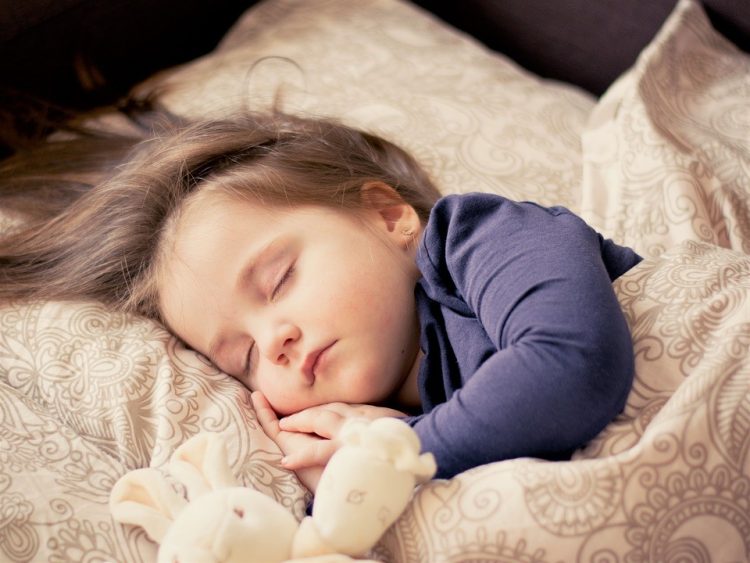Sleep is important at every age because it helps the body to recover and prepares the brain to process new information. It is even more important for kids. Kids’ brains are still growing and they’re learning new things at a very fast pace, so sleep deprivation can affect development, intelligence, behavior, and general health.
That’s why you need to ensure your little ones get enough sleep. A good night sleep doesn’t just mean going to bed at a fixed time. You also need to ensure your kid falls asleep without problems, sleeps throughout the night, and starts the day refreshed & energized.
How Much Sleep Does Your Kid Need?
How much sleep your kid needs depends on the age, but here are some general guidelines to help you determine the ideal number of hours per day.
Babies 0-3 months need between 10-18 hours daily. Since they don’t have an established sleeping schedule, they take naps throughout the day. These naps may last from several minutes to a few hours.
Babies 4-11 months usually start sleeping throughout the night, for about 9-12 hours. At this age, babies also take several naps during the day, lasting from half an hour to two hours.
Kids 1-2 years old need to sleep from 11-14 hours per day, mostly during the night, but they also have naps during the day.
Kids 3-5 years old need to sleep from 11-13 hours during the night. At this age, naps are less frequent and shorter.
Kids 6-13 years old need to sleep from 9-11 hours.
Teens from 14 onward need to sleep 8-10 hours. However, when they reach puberty, their biorhythm changes and they tend to go to bed later.
Sleep Tips for Your Kids
Here’s how to help your kids to get enough quality sleep.
1. Set a bedtime routine
Having a consistent bedtime routine which starts approximately at the same time every night is a great way to establish sleep patterns. For smaller kids, this routine can include a bath and a bedtime story. For older kids, the routine may consist of reducing the activities and relaxing about 30 minutes before the lights go off. Encourage the child to read a book, listen to quiet music, or have a chat with you about their day. If the child needs more than half an hour to fall asleep, the relax time should last a bit longer.
Make sure to keep this routine during the weekends as well; otherwise, it will be difficult for the kid to get back on schedule for the week.
2. Set a Regular Sleep Schedule
Maintain your kid’s wake up time and bedtime at roughly the same time. This will help the body establish a regular pattern. Make sure to keep this schedule during the holidays and weekends. It’s all right if they go to sleep half an hour later or sleep for an additional hour in the morning, but don’t allow anything beyond that.
3. Set a Regular Nap Schedule
Daytime napping is important for younger kids but if they nap a few hours before going to bed, it can disrupt the sleep pattern.
In general, kids stop napping at the age of 4-5. Naps during the day should be avoided at this age because they might make it more difficult for the child to fall asleep at night. However, older kids can also take naps from time to time, especially if they have problems sleeping during the night. These naps should last no more than half an hour.
4. Ensure Your Kid Feels Safe
If you notice that your kid feels afraid about going to bed or sleeping in a dark room, make sure to reward him when he’s brave. Leave the light on if it makes him feel better. In addition, forbid violent video games and scary movies/TV shows before bedtime (or even during the day).
5. Check the Bedroom
Similar to adults, children need quiet, dark, and cool rooms in order to sleep well. Check their room before bedtime to ensure it isn’t too cold or hot, and that there aren’t any noises or lights that could keep them awake. If your little one is very sensitive to noses, consider buying a white noise machine.
6. Limit the Use of Electronic Devices Before Bedtime
At night, our brains produce hormones that help us fall asleep by calming the body. The light coming from electronic displays confuses the brain, which can result in sleeping problems. Take the TV, computer, video games, smartphones, laptops, and tablets out of your kid’s room or at least make sure they’re turned off.
7. No Clocks
Checking the time frequently can also interfere with your kid’s sleep, so it might be wise to ask him not to keep a clock/watch in the room or at least move it out of sight.
8. Good Eating Habits
Ensure that your child has a good meal before going to bed. Also, make sure he takes the meal about an hour before going to bed. Feeling too full or too hungry before going to sleep can make the child uncomfortable and disrupt the sleep pattern.
In addition, make sure that your child gets a satisfying breakfast in the morning to start the body clock and get enough energy for the day.
9. Get Rid of Caffeine
You know how having a cup of coffee late in the day can prevent you from sleeping at night? It’s the same with children. Besides coffee beverages or sweets, energy drinks and sodas can also keep children awake, even when consumed a few hours before bedtime. Be careful with sweets and chocolates before bed as well, because too much sugar can get children extra active and alert.
10. Get Them Active During Daytime
Get the kid out of the house and make sure he’s active.
Getting the kid to be physically active during the day can help him sleep better during the night. Your kid’s activities may involve playing a sport, riding a bike, running around the neighborhood, playing in the park, walking the dog, etc. Ideally, children of all ages should have at least an hour of physical activity a day.
Another benefit of leaving the house is the exposure to natural light. Research has shown that bright light almost completely suppresses the secretion of the sleep-promoting hormone melatonin, which helps the child feel awake & active during the day and, in turn, sleepy before bedtime.
11. Recognize When They’re Sleepy
To see if the established sleeping schedule is efficient, look for signs of sleepiness in the morning. Does your kid look rested and in a good mood or is he grumpy? Does he wake up without a problem or do you need to call him several times? If your kid looks sleepy during the day, then you might want to revise the sleeping schedule or consult a pediatrician.
12. Invest in a Good Mattress
Investing in a quality mattress is an excellent way to help your kid sleep better. Your kid’s mattress should support their changing size, promote healthy posture, and provide a clean and healthy night’s sleep.







Amazing article .. thanks for sharing the tips.. these tips really helps me a lot.. thank you
These 12 sleeping tips would be really a big help for your kids to have a good night sleep.